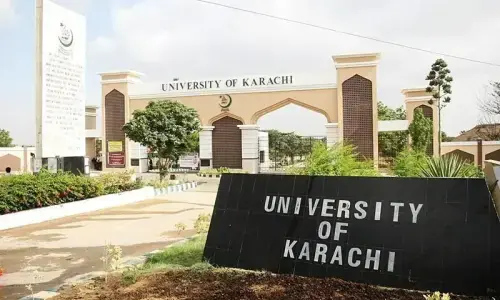KARACHI, Dec 20: Sindh will soon have an exclusive law prohibiting corporal punishment in educational institutions.
The was stated by senior provincial Minister for Education and Literacy Pir Mazharul Haq while speaking as chief guest at a one-day consultation workshop on ‘Developing school-based mechanism to address corporal punishment’ held in a local hotel on Tuesday.
The minister directed the provincial education and law secretaries to expedite the process of preparing a final draft of the ‘Sindh Prohibition of Corporal Punishment Bill, 2011’ so that it could be sent to the chief minister for his perusal and then to the assembly for legislation.
The workshop, organised by the Society for the Protection of the Rights of Child (Sparc), was addressed education secretary Mohammad Siddique Memon, Sindh Ombudsman’s representative Masood Ishrat, Sindh Private Educational Institutions director Mansoob Hussain Siddiqui, Sindh Education Foundation representative Rehana Mughani, Justice for All executive director Haq Nawaz Talpur, Sparc national manager Mohammad Imtiaz Ahmed and provincial manager Suhail Ahmed Abro and others.
Pir Mazhar, referring to the Section 89 of the Pakistan Penal Code that gives immunity to any act that is done with the intention of wellbeing of a child, said that since any amendment to the colonial era PPC involved a cumbersome and lengthy procedure, the Sindh government opted for an exclusive law to prohibit corporal punishment.
He asked the education and law secretaries to incorporate suggestions of the workshop in the draft law before evolving a consensus on it.
The minister observed that as a matter of fact “we have become so accustomed to corporal punishment that we do not even raise the issue at proper platforms”.
Mr Memon assured the workshop participants that until the bill was translated into law, the education department would continue its efforts to develop a mechanism under which complaints regarding corporal punishment at schools could be addressed.
Mansoob Siddiqui observed that incidents of corporal punishment were not confined to public sector schools, adding that such practices were also reported from private schools.
Imtiaz Ahmed informed the workshop that a survey undertaken by his organisation in Khyber Pakhtunkhwa revealed that the percentage of students’ drop-out in that provnce was between 40 and 45.
He deplored that although corporal punishment was prohibited under the Sindh Education Code and a separate directive prohibiting this practice was also issued in 2006 by the then secretary education, neither the code nor the directive was being implemented, the reason being that none of them had a legal binding.
Haq Nawaz Talpur said that Clause 2 of the Section 2 of the proposed bill overrode Section 89 of the PPC, and said that the penalties defined in the bill should have cognizable effects.
Suhail Abro said that in all 54 incidents of corporal punishment were reported in the media during 2010 in the province but the most recent incident in which 64 children were found shackled in a Madressah near Sohrab Goth was a matter of great concern for all.

































